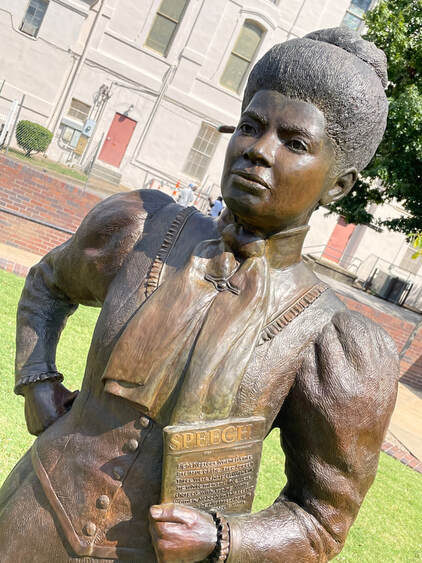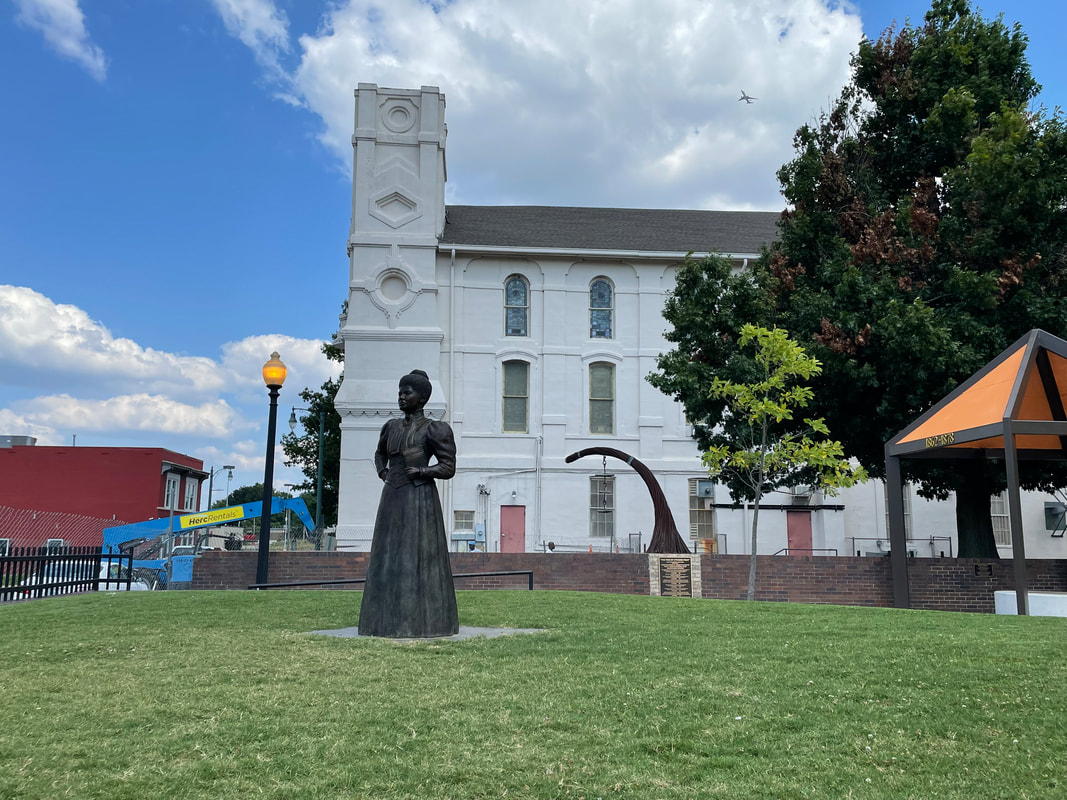More than 100 years after she barely escaped a lynch mob in Memphis, the pioneering civil rights journalist and icon is honored in the city with a new monument.
On July 16, 2021, Memphis unveiled a new life-sized statue of Ida B. Wells. The new monument, installed in the new Ida B. Wells plaza downtown, stands in the shadow of the historic Beale Street Baptist Church, where Wells produced The Free Speech -- the newspaper she edited and co-owned.

Born a slave in Mississippi, Ida B. Wells was freed by the Emancipation Proclamation in 1862. As she worked as a teacher and pursued a college education in Tennessee, however, Wells experienced a country that was in no way keeping that proclaimed promise to its former slaves. Lynching and terrorism had replaced the chains of slavery, and America's new Black citizens had little actual access to the freedom and justice afforded their white neighbors.
She shined a bright light on the core instrument of white terror – lynching – and took on the prevalent incendiary propaganda about Black rape. When she called out this “thread-bare lie” as editor of The Free Speech, she barely escaped lynching herself. From New York and Chicago, Wells published relentlessly on lynching and white terror, gave lectures, corresponded with other influential voices, helped found the NAACP.
"She was a story warrior -- she believed that shining a light on the terror and injustice of 'lynch law' could bring about its end," says Stinson Liles, who hosts the Southern Hollows history podcast and wrote the foreword to a new anthology of Ida B. Wells' most pivotal works.
The statue and plaza project cost an estimated $250,000, raised from the community.
Michelle Duster, a Wells descendant and president of the Ida. B. Wells Foundation in Chicago, was present for the unveiling and told the crowd, "In the spirit of Ida B. Wells, we will not be silenced. We will not be marginalized. We will not allow our truths, our stories, our experiences to be minimized or erased... What you have created here with this Ida B. Wells statue and Ida B. Wells Plaza is of national significance and a source of pride for our members and the country."
According to Dr. LaSimba Gray, chairman of the Memphis Memorial Committee, the statue is the only fill-size statue of Wells in the country.
She shined a bright light on the core instrument of white terror – lynching – and took on the prevalent incendiary propaganda about Black rape. When she called out this “thread-bare lie” as editor of The Free Speech, she barely escaped lynching herself. From New York and Chicago, Wells published relentlessly on lynching and white terror, gave lectures, corresponded with other influential voices, helped found the NAACP.
"She was a story warrior -- she believed that shining a light on the terror and injustice of 'lynch law' could bring about its end," says Stinson Liles, who hosts the Southern Hollows history podcast and wrote the foreword to a new anthology of Ida B. Wells' most pivotal works.
The statue and plaza project cost an estimated $250,000, raised from the community.
Michelle Duster, a Wells descendant and president of the Ida. B. Wells Foundation in Chicago, was present for the unveiling and told the crowd, "In the spirit of Ida B. Wells, we will not be silenced. We will not be marginalized. We will not allow our truths, our stories, our experiences to be minimized or erased... What you have created here with this Ida B. Wells statue and Ida B. Wells Plaza is of national significance and a source of pride for our members and the country."
According to Dr. LaSimba Gray, chairman of the Memphis Memorial Committee, the statue is the only fill-size statue of Wells in the country.
If you haven't read Ida B. Wells' chilling accounts of turn-of-the-century lynching, what are you waiting for?The four historic works in this collection, taken together, paint a picture in full of Wells-Barnett's gifts. Writer, activist, editor, analyst, statistician, orator, advocate, essayist—she was a rare talent and a force who altered the trajectory of America.
|

